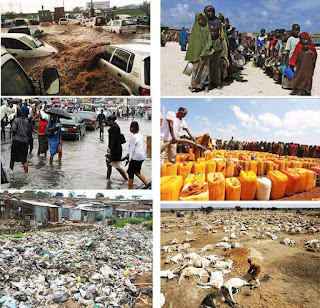Food loss and food waste refers to the decrease of food in subsequent stages of the food supply chain, intended for human consumption.
Food waste goes beyond the consumable food substances or produce that has been thrown away. Food loss and waste also results to a major wastage of resources, including water, land, energy, labour and capital.
According to Food and Agriculture organization of United Nations (FAO), an estimated 30 per cent of food produced for human consumption is lost or wasted globally,this amounts to 1.3 billion metric tonnes of food produced per year.
The report says that, food currently lost in Africa could feed 300 million people. If one-fourth of the food currently lost or wasted globally could be saved, it would be enough to feed 870 million hungry people in the world.
In many developing countries,factors such as financial constraints,poor harvesting techniques,storage and cooling facilities promotes food waste and losses. This results to loss or low income to the farmers and higher prices to the consumers.
Establishment of a strong and effective supply chain by supporting farmers,good infrastructure, transportation and creation of food processing and packaging industries could help to reduce food loss and waste.
A report from Food and Agriculture Organization of United Nations indicates that most of this wastage occurs in the developed world; per capita food waste by consumers (not including the production process) in Europe and North America is around 95-115kg per year, compared to just 6-11kg in sub-Saharan Africa and South/South-East Asia. Large amounts of food is still lost during the production process in developing countries, however, due to lack of infrastructure and poor equipment. Wastage at the consumption stage in these countries, meanwhile, is drastically less than developed nations.
The environment is also at risk as a result of immense food waste and losses. The carbon footprint of wasted food is estimated at 3.3 gigatonnes. FAO says that, if food waste were a country, it would rank behind only the US and China for greenhouse gas emissions.
Bulk shopping of human consumable products leads to more food waste. To reduce food wastage, avoid buying more food than you need. Instead make frequent trips to the grocery store every few days rather than doing a bulk shopping trip once a week. Make a list of items that you need to buy and stick to that list. This will help you reduce impulse buying and reduce food waste as well.
Improper storage leads to a massive amount of food waste. Store your food correctly. According to the Natural Resource Defense Council, about two-thirds of household waste in the United Kingdom is due to food spoilage.
Food crop productivity in most of developing countries have failed to exceed the population growth,leading to food insecurity. Reducing food loss and waste would nobly help in tackling food insecurities,promote growth and development and improved health.







No comments:
Post a Comment